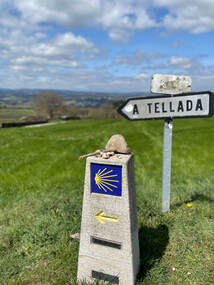 Way marker for the Camino de Santiago, showing items pilgrims have left behind to symbolize letting go of baggage. Way marker for the Camino de Santiago, showing items pilgrims have left behind to symbolize letting go of baggage. Young student athletes may not realize it yet, but parents in competitive youth sports know that even though the days are long, the years fly by. If we know this, then why don’t we learn to savor the little moments of the sports journey instead of rushing about from one thing to the next, cramming as many things into a day as possible? When we strive for efficiency just to achieve more (rather than as a means to free up time for hobbies and quality time), then efficiency is just code for pressure. And the pressure we have created here in the US has spread around the world. Recently I met some friends from Guadalajara, Mexico whose children attend the American School there—a bilingual private school that issues both a Mexican and a U.S. high school diploma. Although they are Mexicans living in Mexico, my new friends said, their kids are expected to keep up with the pace of the American academic system, applying to dozens of universities and participating in multiple sports and activities. It’s all about standing out from the competition. I am a highly sensitive recovering perfectionist who suffers from anxiety and is easily overstimulated. As such, competition is a chronic stressor for me. While I have implemented many tools to be less bothered by others' words and actions and to stay grounded in my own journey, many days are still a struggle. Do more, be more, buy more, the world around us says. When the pace of growth and information overload makes our bodies and minds suffer, it’s time to step away from the competition and courageously and honestly give ourselves a reset. What kind of reset? Sometimes a reset may look like embodiment practices such as restorative yoga, conscious breathing, and walking in nature. Other times it may look like journaling, meditation, and talk therapy. Even other times, though, that reset might look like a dramatic change of scenery. Over twenty years ago I learned that one of the best ways for me to reset my nervous system—bring it back into balance—after chronic overwhelm was to get far away from the outside influences and expectations pulling me in all directions. I like to go far enough away that it’s clear to myself and others that communication will be minimal while I’m away. If you or others have a hard time respecting your boundaries, or if you are easily overwhelmed by competing demands, this type of physical distance can be a helpful tool for a personal reset. To be clear— getting away is never an escape from your problems long-term. You must do deep work on yourself for any change to be lasting. Mindful travel, however, is an opportunity to reset your nervous system out of fight or flight mode and to help you see things through a different lens. To this end, I decided to travel to Spain to walk the Camino de Santiago.
0 Comments
5/27/2022 0 Comments Why I Started to Drop the Ball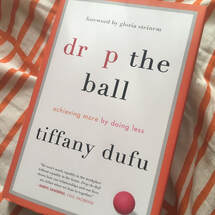 Tiffany Dufu’s Drop the Ball is a game changer for me and for any former athlete struggling to move past the hustle culture of high-level sports. While Dufu spends a bit of time pointing out facts about the gender based pay gap and the need for all-in-partnership in the home, the more impactful parts of the book are her tangible examples of the emotional labor imbalance and how that relates to her journey as a recovering perfectionist. So often perfectionists don’t allow others to do the work if it’s not done as they (we) would do it. The main point of Dufu's book, though, is that perfectionists have to be willing and able to "drop the ball" before others will pick it up. This holds true in school work, volunteer work, housework, and on and on, where the work simply doesn't need to be perfect...where it just needs to be good enough. As two of my coaches often say, "We must learn to embrace the B-." In her book Dufu chronicles the humbling experiences of letting go of tasks in the home in order to achieve some of her more important life’s work—advancing and empowering women and girls and raising two children to be globally conscious citizens. If we are too busy checking things off our to-do list to cultivate a network of relationships, or if we are too caught up in the minutiae of day-to-day life, we simply cannot have the bandwidth to tackle larger, more important projects. Dufu provides real examples of how she worked through some sticking points in her life to discover not only her core values but also how to empower her partner at home to share more of the workload. She says women have faith in a “false meritocracy” (p.64), which often leads us to expect that we can work harder and will naturally be recognized for our productivity. Therefore, we work and work and work to the detriment to our mental, physical, and emotional health. 2/25/2022 0 Comments Keep It In Perspective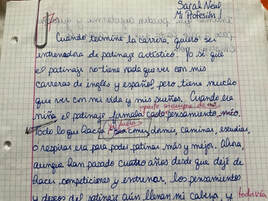 Since I retired from my role as Learn to Skate Director, I’ve been blessed to be able to fall back on my language teaching skills. I began teaching university-level Spanish in 1998 and started teaching Spanish in person again this semester. A new perspective and refreshed outlook after time away has done wonders for my teaching and for my connection to the students. Sometimes a short vacation isn’t enough time away from something—it’s possible we need a much longer break. In my case, it was several years with one toe still in the water, but with my heart fully in skating. Now, I shift to the other foot—I am diving back into teaching, hoping to teach abroad again, and have one foot still in skating, but much of my energy elsewhere. Last week as I was reading through some old notebooks working on a course proposal teach abroad, I came across this essay I wrote for a composition and grammar course while studying in Spain many, many years ago. The topic was “My Profession”. Here’s the translation for you: “When I finish my degree, I want to be a figure skating coach. I know that skating has nothing to do with being a Spanish and English major, but it has a lot to do with my life and my dreams. When I was a child, skating was always on my mind. Everything I did—whether it was sleep, walk, study, eat, or breathe—it was to be able to skate more and better. Now, even though it’s been four years since I stopped training and competing, thoughts and dreams about skating still fill my head and I still want to go back to where skating was my life.” What a young mind it was that wrote that! The essay goes on, but this section is the most impactful part, I think. Each of you will read this in a different way, colored through the lens of your own lived experience, but for me reading it brings up many conflicting emotions. My complicated journey in the sport makes me wistful for the dreams that could have been, glad for the ones that did, and pained for the damage done in the process. Maybe you can relate? If I had known yoga at that time, I would have approached so many aspects of that dream differently, but then I might not be here writing this piece for you. Sports are wonderful for so many reasons--testing our limits, lifelong friendships, goal setting time management, healthy lifestyles, confidence building, and more... but what happens when the dream of pursuing our sport must take a pause? Or when we get or ill and can no longer live out that dream? Or when life circumstances place us in a city where living the dream isn’t lucrative enough to bring financial security? Or when the schedule your sport requires prohibits you from being present for your family? It is important that we allow our athletes and our children to live their dreams, but it’s crucial that we also allow them to pursue other avenues in life—get an education, take a vacation, have other hobbies—and understand that we can’t put all our eggs in one basket. Even Olympic champions can go to college--thank you, Nathan Chen, for being so open about that. Skate or play tennis or surf or whatever you choose as much as you possibly can as long as you can to live your dream--AND also educate yourself to keep things in perspective. Sport is only one small part of life, even when we think it’s our everything. 11/11/2021 0 Comments In Times of Transition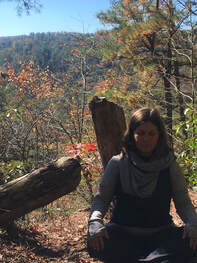 Northern Arizona has four seasons, unlike the rest of Arizona. Phoenix is glorious in the winter, and miserable in the summers, and the landscape is made of various shades of reds and browns. It’s beautiful, but it stays the same year-round. When I lived in Arizona, of all the things I missed about Kentucky besides my family, I missed the changing seasons the most. That most visceral reminder of the passage of time and the cycles of life is like a road map guiding us on our journey. The timelines of my memories from Arizona aren’t as clear as they are of memories from other places simply because the landscape doesn’t change very much throughout the year. Life is full of transitions—from one season to the next, one relationship to another, beginning and ending semesters, changing jobs, growing children, retirement, and on and on. Sometimes we mark the dates on the calendar months in advance, and other times, radical change is forced upon us at the most inopportune times. Everyone knows this, and writers of all genres from ancient literature to pop songs have written about it. The only thing constant is change, right? Yet, as humans, we try to fight the end of a season and cling to what is in front of us, sometimes even while we are dreaming about something different. A summer’s last hurrah, the sledding adventure in March, the pleading with an ex-boyfriend to please come back are all examples of this. In our professional or athletic lives we can be completely burnt out and still want to stay in the game. Why do we resist making a change(s) that is necessary to move us forward? Because our brains are hard-wired to be fearful of new things and because change can require a lot of work. One thing you realize as you get older, though, is that changes will come whether you are ready for them or not. Family members get sick, we get injured, children and parents get older, the economy goes up and down, accidents happen, and people around us make decisions that impact us. Right now, I’m closing another chapter in my professional life to hopefully forge a new one a few years sooner than I imagined. At the same time, I am caring for a very ill, aging aunt who just wants to feel safe and loved, and helping my son write essays for the convoluted high school application process we have in our school district. In mid-summer I did not know I was heading towards any of these concurrent paths, yet somehow I ended up here. And I’m trying to be more present than ever for my family, maintain my health and sense of self, while still serving the students I deeply care about. The question begging to be asked, then, is how do we adapt to such sudden changes? How do we navigate life’s big transitions gracefully? I find the answer to be simple: Always go back to a yoga practice that incorporates breathwork, asana, and meditation. There are many reasons this works, but my favorite way to explain it clearly is that the breathing sets the stage for the movement, and the movement helps you sit still enough to meditate comfortably. The breath and the movement work hand in hand to balance the nervous system and strengthen your stress response. Then, in the stillness of the meditation is where you can find what you’re looking for—the courage to identify and let go of whatever is extra and stand firmly present in what matters most to you. The sooner we get used to idea of constant change (for good and bad), the sooner we can stop fighting the transition and go with the flow. Don’t get too attached to the phase of life that you’re in—try to experience it in its fullest, because you never know when the next chapter will begin. In the meantime, do more yoga. Don't know where to start? Check out some of my free practices. 9/24/2021 0 Comments The Pressure to Perform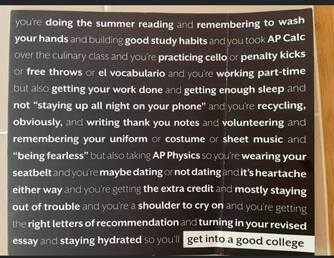 Sometimes life weighs you down. As an adult, that weight may be the pressures of work and caretaking—of children, parents, spouses, friends, and community. For athletes, though, it’s usually the pressures of performing academically and athletically and of the future that weigh them down. We have done such a good job of stressing the importance of making good decisions to our kids, that we have collectively managed to create a generation of youth that is breaking under the weight of future expectations. I came across this photo on a friend’s facebook the other day (source unknown) and it really hit home. If reading this leaves you breathless, imagine how it must feel to a teenager that’s trying to live it. These are very privileged worries that don’t involve food insecurity, homelessness, abuse, or violence of any kind, but they are real worries for many kids. When did childhood become such a race to cram in all the information and achievements? When did it become all or nothing? I’ve written a bit about the need to drop the ball as an adult… there are just some things we have to let go of to maintain our mental and physical health. As parents and coaches, it’s our responsibility to not only teach kids about good choices but also about resilience and perspective. They don’t have to kill it on every assignment, and it’s ok if they skip a couple of days of piano practice if they need a bit of extra sleep. We have to teach them to juggle it all, how to choose which ball to drop when, and how to respond appropriately when they choose incorrectly.  Leaving competitive sports behind is a lot like breaking up with a significant other. Either you're the one who chooses to end it, or someone or something chooses for you. When you retire from sports, sometimes it’s because you don’t make the cut for the team, or maybe you have a career-ending injury, you graduate, a parent loses a job or they get divorced, or maybe you just don’t love it enough anymore to keep making the required sacrifices. Or maybe a tragedy (or pandemic) leads your peers to grow apart and your family to reevaluate your current financial and emotional investment. No matter the reason, leaving competitive sports almost always entails an agonizing transition for an athlete. 7/12/2021 0 Comments Why beach time?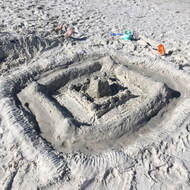 For as long as I can remember, my family and I have been going to the beach at the beginning of June. When I was little, it was my parents, my sister, and I that went. Through middle and high school, my aunts, cousins, mom, and I travelled together. When I moved away for several years I couldn't join them, but once I came back to Kentucky, my parents and I started the annual tradition again. This post-COVID vaccine year, my husband and stepson joined us. While I love adventure and travelling new places, going to the same beach has become somewhat sacred to me--a ritual, if you will, and it's one that I look forward immensely. I read books, listen to the surf, wear a fancy sun hat, and visit our favorite restaurants. It's fun in the sun and sand (have you built a sand castle lately???), and a time to rest and smell the salty air. In sports we are always training towards that next goal or the next great feat, and we don't prioritize time off for recovery or family. Our competitive society teaches us that our worth is measured by our productivity, and our sports conditioning truly makes us believe it. We forget that we are enough as we are. We forget that the beauty of life is found in the small things. Because of this, when you leave sports, you may feel lazy or unproductive when you don't continue to achieve "great things". You may feel lost, looking for ways to build community, find purpose, and regain control of your life. One way to help regain control is to use rhythm and ritual to help ground yourself. Rituals have been a part of the human experience for thousands of years, and while modern society has drifted away from them, there's no doubt they can have a major impact on our lives. Paying attention to the rhythm of the seasons and celebrating and creating traditions with loved ones can bring new meaning to your life, especially when things feel otherwise chaotic. For me, sitting by the pool with my mom every June in St. Pete Beach is one of those rituals that always brings me back to my core. 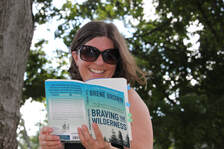 Some of you may have heard me mention this book a few moths ago, but it’s so good, that I have to bring it back into the conversation. In fact, it’s so good, that I have chosen it for the inaugural Skating Yogi Book Group. Here’s why: At the start of 2021, I decided to do some deep personal work and dive into some of my mental and emotional sticking points. As part of this, I took part in a 6-week immersive course by my friend, the amazing Dr. Katie Blake. This course was intended to guide participants through the process of deconstructing faith, offering support and community rather than dogma. It turns out that deconstructing faith is quite similar to dissecting the components of any culture or belief system, including those of competitive sports. This makes sense, since sports and religion have been intricately linked since ancient times in Native American, Eastern, and Western civilizations. While modern sports are a secular pursuit, many of the values and details of religion and sports are the same. Both deal with relationships to self and others, personal sacrifice, the pursuit of non-material achievements, and the promotion of purity and higher ideals. Additionally, both rely on ritual, rulebooks, holy houses, and heroes, and both can unite a group of people or tragically divide them. The first book we read in Dr. Katie Blake’s course was Brené Brown’s Braving the Wilderness. In this book Dr. Brown talks about our deep, biological need for community and how this need is becoming harder and harder to fulfill in today’s polarized society. Finding community has become even harder since the onset of the COVID-19 pandemic and the escalations of political tensions. Sports clubs and churches have traditionally offered us this belonging, but as society has become more fragmented, fewer people are staying in communities that we once were a part of. Leaving a restrictive community can be liberating, particularly for people who have traditionally been oppressed. Nevertheless, this freedom can also leave us quite alone. As Dr. Brown says, even as our need for community is greater than perhaps ever before, we are isolating ourselves more and more. We have lost our ability to find common ground, so we retreat. How do we fix it? According to Dr. Brown, the only way to fix our isolation is to learn to belong to no one but ourselves. You read that right—in order to find community with others, we must learn to belong primarily to ourselves. In Braving the Wilderness, Dr. Brown explains her theory of belonging from her 2010 book titled The Gifts of Imperfection, saying: Belonging is the innate human desire to be part of something larger than us. Because this yearning is so primal, we often try to acquire it by fitting in and by seeking approval, which are not only hollow substitutes for belonging, but often barriers to it. Because true belonging only happens when we present our authentic, imperfect selves to the world, our sense of belonging can never be greater than our level of self-acceptance. Wow. Read that last line again—“… our sense of belonging can never be greater than our level of self-acceptance.” We have all heard the sayings “you can’t help someone if they won’t help themselves” or “you can’t accept love until you love yourself”, and maybe we have even had experience with these realities. Either way, reading Dr. Brown’s theory of belonging helped things click for me in a completely new way. How often do we do or say things just to fit in? When you are having doubts about your sport or your desires to keep competing, or are growing apart from your friends and teammates, how long are you willing to hide your true desires from yourself and others? How much of yourself are you willing to sacrifice? Authenticity takes courage, but it’s the only true path to belonging. Dr. Brown goes on to say: True belonging is not something that you negotiate externally, it’s what you carry in your heart. It’s finding the sacredness in being a part of something and in braving the wilderness alone. When we reach this place, even momentarily, we belong everywhere and nowhere. I am here to tell you that you can find your place in sport and still be your authentic self. You can be part of a club or a team and not sacrifice your sense of self. As one of my students once said, “I realized that you can have friends and not be BFF’s with all of them”. If your current situation in sport does not allow you to be your true self, then I encourage you to explore why and to reach out for help to explore your options. Only when we belong to ourselves can we truly belong anywhere. This is my hope for you. Our first book club chat will be Sunday, Aug 15, 6:15-7:00 pm EDT. Register here (it's free) and join us! We will discuss Braving the Wilderness in more depth. To support local booksellers, you can purchase your book here. (This is an affiliate link, and I earn a small commission with each purchase). Are you looking for guidance on how to transition into a new place within or beyond your sport? Sign up for my mailing list to receive my 7 Principles for Life Beyond Sports to help you on your journey. |
Author // the skating yogiMy name is Sarah Neal. I have been immersed in the world of figure skating for over four decades. I have seen firsthand the abuse that happens at the higher levels of our sport and experienced how that trickles down into unhealthy training practices and habits at the grassroots. I have seen this play out in the operations of the very institutions that control our sport. Whether for a profession or hobby, pursuing skating should be a joyful, rewarding process, an opportunity for athletic and personal growth, and a place to build lasting friendships. Archives
March 2024
CategoriesAll Athlete Well Being Athlete Well-Being Deep Connections Embodied Movement And Meditation Practices Life After Competition Mindful Living |
Search by typing & pressing enter

 RSS Feed
RSS Feed